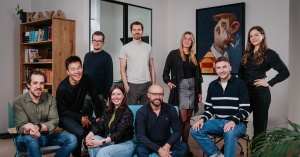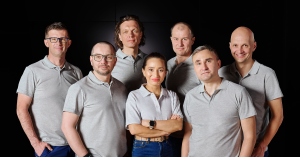Leveraging the power of language models, such as OpenAI’s Chat GPT, as well as social media, such as LinkedIn, for startup sourcing and categorization can change the way VCs develop their traditional dealflow and evaluate startups. In this article, we aim to provide a comprehensive guide for those interested in exploring AI’s capabilities without requiring coding expertise.
As tech journalists, we want to stay ahead of the curve as well, so we invited Vlastimil Vodicka, CEO and Founder of Leadspicker, to shed some light on the subject, and explain how investors can use AI in venture capitalto spot promising startups and founders early on even without coding skills.
Leadspicker, the company founded by Vodicka, offers three products: Startup Scout, Sales Booster, and Pipebooster.io, which are used to automate repetitive sales tasks and attract new clients.
One notable aspect of Leadspicker is its utilization of machine learning to identify emerging tech startups, even those businesses which are not listed in existing databases. On a monthly basis, the Leadspicker team sources startups and leads for more than 25 accelerators and corporate entities, counting major names such as PwC, Vodafone, Pfizer, and Axel Springer Plug&Play among their clients.
Vlastimil provided us with a step-by-step guide to how modern startup sourcing tools replace the traditional warm introductions and allow VCs to discover hot emerging companies and promising founders at scale.
How does AI in venture capital startup sourcing work?
In a nutshell, AI startup sourcing follows the same process as traditional outbound sourcing – identifying early-stage startups and founders, digging deeper to find out more data about them, and trying to see whether they fall in any of the target verticals of the fund.
In the quest to identify the most promising early-stage companies, AI-based sourcing tools need to be fed with accurate and trustworthy data. Vlastimil explains what data inputs and sources they use at Leadspicker.
“Firstly, we regularly monitor various data sources, including LinkedIn profiles. Specifically, we focus on individuals who have recently established job titles such as founder, co-founder, CEO, COO, CTO, or those associated with emerging companies operating in stealth mode. Moreover, we utilize major global databases akin to Crunchbase, along with directories such as Product Hunt and crowdfunding platforms, to unearth new and emerging companies,” he explains.
Furthermore, they recognize the significance of smaller, more localized startup directories that tend to be overlooked. By exploring these niche websites that concentrate on specific regions or industries, they enhance their chances of uncovering valuable data sources.
“To remain up-to-date with the latest trends, we diligently monitor prominent tech media outlets and blogs, including TechCrunch, Sifted, and even local platforms like CzechCrunch. These sources provide valuable insights into the most recent and noteworthy companies worldwide.
Additionally, we tap into the vast potential of relevant Facebook groups and other online communities. By leveraging these platforms, we can identify founders and other key personnel who may offer valuable information. For instance, the AustrianStartupPinwall Facebook group serves as an example of the communities we engage with,” Vlastimil shares.
In addition to these regular sources, Leadspicker also uses ad-hoc data sources such as conference networking apps. “After the conference concludes, we compile a list of attendees, including their names, company names, and company types. Subsequently, we employ our tools to enrich this data with relevant URLs, LinkedIn profiles, contact details, and other pertinent information,” he adds.
Another data point they use is the portfolios of incubators, startup competitions, accelerators, and other venture capital firms. In the end, the data collection process is completed by scraping and crawling both private and public data sources, such as LinkedIn and public registries.
After all of these data inputs have been collected, the algorithm works its magic and helps investors (or curious tech journalists) spot some hidden startup gems.
Discovering New Startups in CEE: The Outcome
To see how AI-powered startup sourcing works in practice, I asked Vlastimil to share with me the names of promising early-stage CEE founders who used to work at high-valuation tech companies and recently founded their own companies.
“Our classification process revealed that since 2021, there have been more than 8K companies in the CEE region that the algorithms classified as possible startups. However, after enriching the data and classifying it, we came up with the following names of promising CEE founders:”
Name: Dan Glăvan
Country: Romania
Position: Co-Founder & COO of a Startup – In Stealth Mode
Background: Previously, Dan worked at Uber as Head of Operations, Balkans and CEE, and Head of Customer Experience, in Germany. After that, he joined the international tax automation and compliance solution provider, Fonoa, where he was responsible for building operations. In December 2022, he started working on his own company, which is still in stealth mode.
Name: Alexandru Razvan Caciulescu
Country: Romania
Position: Founder and CTO at Goodlegal, a legal infrastructure platform.
Background: Alexandru has worked as Senior Software Security Engineer at UiPath and has spent some time as an Engineer at J.P. Morgan. For the past year and a half, he has been working on the development and launch of Goodlegal. His company has already attracted €1.2M from Earlybird Venture Capital, Underline Ventures, and Credo Ventures. Currently, he is also a Teaching Assistant at the Politehnica University of Bucharest.
Name: Mihnea Dobrescu-Balaur
Country: Romania
Position: CTO at StakeBorg, a startup that facilitates blockchain adoption through education and user-friendly infrastructure.
Background: Prior to co-founding StakeBorg in January 2023, Mihnea spent 4 years in various software development managerial roles at the marketing technology company Hootsuite. After that, he worked another 4 years at the mobility unicorn startup Bolt where he grew into the role of Senior Engineering Manager. Right now, alongside building StakeBorg, Mihnea is also a Techstars mentor.
Name: Mihai Stancu
Country: Romania
Position: CTO at YAROOMS, a workplace experience software suite that helps companies track their CO2 emissions while managing people and spaces in a hybrid work environment.
Background: Mihai has worked as a Senior Software Engineer and Tech Team Lead at the CEE e-commerce giant eMAG. Before co-founding YAROOMS in November 2022, he also worked at Bolt as Senior Software Engineer.







